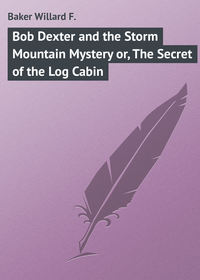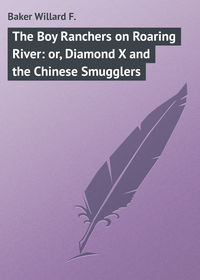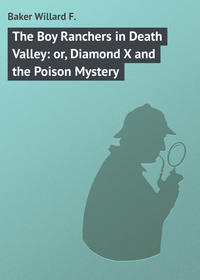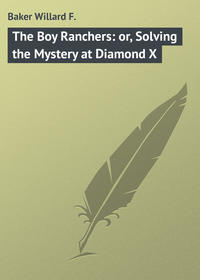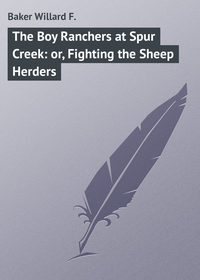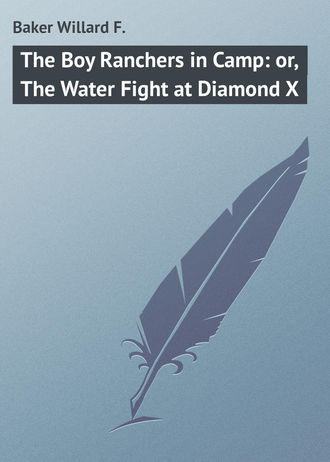 полная версия
полная версияThe Boy Ranchers in Camp: or, The Water Fight at Diamond X
For more than a week nothing happened. The cattle at Flume Valley, including those of the boy ranchers, and the herd transferred from Square M to save it from the epidemic, were doing well, abundant grass and water being their portions.
There was no lack of hard work for the boys and their cowboy assistants, for it was not all easy sailing. Occasionally bunches of steers would stray, and have to be driven back by hard riding. There were night watches to be carried on, and another bunch of cattle was shipped away.
Bud, Dick and Nort hazed them over to the railroad, and on the trip a small-sized stampede gave them all they wanted to handle. But they were true sons of the west, and did not complain.
"Whew! That was hot, while it lasted!" exclaimed Bud, as he and cousins managed to get the stampeding animals quieted, after they had tried so hard to run off by themselves, in varying directions.
"Yes, a thing like that gives you an appetite," remarked Dick.
"As if you ever needed any stimulant!" laughed Nort. "I never saw the time yet when you had to be offered an inducement to sit up to grub!"
"You either!" retorted the stout lad. "But, speaking of grub, when do we eat, Bud?"
"Might as well make it right soon," was the answer. "Now that we have the steers quieted they'll be glad enough to take it easy. I planned to water 'em at the next stopping place, and that will give us a chance to see what Buck Tooth put up for us."
"Stay there all night; will we?" asked Nort.
"Might as well," assented his cousin. "No use running all the fat off our stock. We want 'em to weigh as heavy as possible."
This was good business tact on the part of the boy ranchers. For cattle are generally sold by weight, either "on the hoof," which means alive and as they stand in the stock yards, or by weight after being slaughtered. In the case of ranchers "on the hoof" is generally understood.
And driving a bunch of steers at too great a speed from the ranch to the railroad would make them thin, "running off their fat," so to speak, thus losing all the advantages of the rich fodder to which they had had access. And when it is considered that it is not at all difficult to cause a steer to lose from ten to fifteen pounds by means of poor driving, and when to this statement is added the fact that this loss is multiplied in hundreds of steers, Bud's state of mind can easily be imagined.
"Yes, we'll get 'em quieted down, and take it easy ourselves," suggested the Western lad. And, a little later when some of the steers broke into a run, Nort exclaimed:
"Are they stampeding again?"
"No. I reckon they just smell water," Bud answered.
This proved to be true, and this contagion spread all through the herd, though with no ill effects, for the water hole was not far off and, reaching it, the animals stopped to drink.
There was some confusion and excitement because so many thirsty cattle all wanted to drink at once, but it did not last long, and Bud, Nort and Dick were glad when they could slip from their saddles, tossing the reins over their ponies' heads as an intimation to the animals not to stray.
"Oh boy! But I'm tired!" exclaimed Nort, sighing.
"Add hungry to that and I'm with you," said his brother. For there had been days of long and difficult work in preparing this bunch of cattle for shipment.
"Getting tired of the game?" asked Bud, as he rustled up some sticks of greasewood to make a fire over which they might boil coffee and fry bacon.
"Not on your life!" laughed Nort. "We're in the game to stick!"
"Sure thing!" asserted Dick.
They made a simple but ample meal over the camp fire and then, as evening settled down over the vast prairies, and quiet enfolded them like some soft mantle, they lay on their blankets and gazed at the feeding cattle.
The steers were very quiet now, evidently feeling quite satisfied with the manner in which they had been treated, and having, of course, no intimation of the fate in store for them. They had food and water and that is all they required. Overhead was the cloudless sky, in which sparkling stars were beginning to stud themselves.
"I hope the market is well up in price when we get to the yards," observed Bud, idly chewing on a spear of grass.
"Yes, it would be dandy to get a big price for this stock," agreed Nort.
The boy ranchers were rapidly becoming interested in the business end of their venture, as they had been, for some time, in the more picturesque side. The difference of a fraction of a cent in the price of cattle on the hoof meant the difference of several hundred of dollars where there were many tons of meat to be considered.
"Well, we'd better ride herd a little while, to make sure they get bedded down quietly," suggested Bud, as it began to get darker. "Then we'll roll up and snooze ourselves."
This "bedding down" of the cattle, meaning thereby inducing them to get quiet enough so they would lie down contentedly chewing their cuds, was part of the routine of a cowboy's life.
"Some of 'em have already started in," observed Nort, as he went up to his pony, which, with the other two animals, had been contentedly grazing. "Looks like they'd lived here all their lives."
He indicated a score or more of the steer's that were stretched out on the rich grass which at once formed their food and their bed.
"Yes, I reckon we'll have a quiet night," observed Bud.
The three chums slowly rode around the bunch of cattle, the lads occasionally breaking into the chorus of some song.
The cattle seemed to like this singing – not that this is to be considered a compliment to the voices of Nort, Dick and Bud, though their tones were far from unmusical. But the fact is that animals of most sorts are fond of music in any form, and nothing so seems to soothe and quiet a bunch of cattle, especially at night, as the singing of the herders.
Perhaps it is due to this fact that we have so many cowboy songs with an interminable number of verses, in which there is little sense or sequence – a mere jumble of words, often repeated. The cattle seem to care more for the tune than for the sentiment.
At any rate the bunch from Flume Valley grew more quiet as the night became darker, and when the remains of their camp fire gleamed dully in the blackness, as they made their way back to it, Bud and his cousins considered their work done for the day.
"We won't stand any regular watch," Bud said. "I think they'll be all right. But if we should hear a disturbance – I mean any one of us – he can awaken the others, and we'll do whatever we have to."
"And if we have any luck we won't have to roll out," observed Nort, as he spread out his blankets and tarpaulin, which last was to keep the dampness of the ground away.
"Then I'm going to cross my fingers for luck," observed Dick.
Save for the occasional distant howl of a coyote, or the uneasy movement of an occasional steer, with, now and then, the clashing of the horns of some of the beasts, there was silence in the camp. Bud was the first to fall asleep, because he was more accustomed to this sort of life than were his cousins. But they were rapidly falling in with the ways of the west, which teaches a wayfarer to consider home wherever he hangs up his hat, and his bed any place he can throw his blanket and saddle.
But finally Nort and Dick dropped off into slumber, which became sounder as the hours of night passed. All three of the boy ranchers were tired and they were in the most healthful state imaginable, brought about by their life in the open.
"What hour it was Dick had no idea, but he was suddenly awakened by sensing some movement near him – too near for comfort considering his exposed sleeping position. For he felt something cold and clammy at the back of his neck, as though a chunk of ice, or a hand dipped in cold water, had touched him.
"Hi! Who's doing that?" yelled Dick, for he had a sudden dream that he was back at school, and some one was playing a trick on him. "Cut it out!"
No sooner had he spoken than he realized that he had awakened Nort and Bud, for by the flickering light of the embers of the fire he could see them sitting up and staring over at him.
"What's the matter?" demanded Bud.
"Something tickled the back of my neck," declared Dick. "I guess a coyote must have been picking up scraps of food, and smelled of me. Hope he didn't take me for a dead one!"
"Coyote!" exclaimed Bud. "I don't believe you could get one to come near you, not as long as you breathed. It must have been a – "
"Snake!" broke in Nort, without thinking of what the word might mean.
"Wow! Don't say that!" cried Dick, and he leaped up, scattering his blanket and tarpaulin each in a different direction.
"Shut up!" commanded Bud, laughing. "Do you want to start the cattle off again? If it was a snake it won't hurt you, and it was probably more scared than you, Dick."
"Yes – maybe!" said the other. He lighted a stick of greasewood at the fire, and looked about his part of the sleeping ground. But he found nothing in the animal line.
"Guess you dreamed it!" said Nort.
"I certainly did not!" emphatically declared his brother.
"Well, go to sleep again," advised Bud. "If you feel it a second time call me!"
"Huh! I'll do that all right!" declared Dick. He carefully shifted his sleeping place, making a searching examination of the ground before spreading out his tarpaulin. And he was some little time in dropping off to slumber again.
But there was no further disturbance in the night, and in the morning Bud looked for marks on the ground, declaring the visitor had been a prairie dog, which Dick declared his unbelief in, sticking to the snake theory as being more sensational.
After breakfast they started to drive the cattle again, reaching the railroad yards and successfully transacting the business of selling their stock.
It was the night that Bud and his cousins returned from having driven the steers to the railroad yard that something happened which again brought to the front all their worries and anxieties.
They were all seated about the camp fire, and Pocut Pete had just arisen, remarking that he would get ready for his turn at night-riding, when there was a sort of hissing in the air over the heads of those gathered about the blaze, and something hit the ground in the midst of the circle.
"What's that?" exclaimed Nort
"An arrow!" answered Bud, and so it proved. An Indian arrow – of the sort used by the Redmen years ago, and hard to pick up now, even as relics – quivered in the ground near the blaze. And by the flickering flames it was seen that a paper was rolled about it.
In an instant Bud had leaped to his feet, plucked the arrow from the ground, and torn off the paper. By the light of the fire he read it.
"Another warning!" cried Bud.
"What does it say?" demanded Dick.
Bud read:
"Two wasn't enough. This is the third and last! Leave Flume Valley!"
There was silence for a moment, and then Bud, crushing the scrawled warning in his hand, cried:
"I'd like to see 'em drive me out!"
"That's th' way to talk!" shouted Yellin' Kid. "We'll stick!"
They gathered about, discussing the sinister warning that had been sent to them in such a sensational manner. There was no clue to tell where it had come from, for no one had noticed the direction whence the arrow had been shot. The message itself was written, or, rather, printed on a piece torn from a paper bag, and the writing was in pencil. The paper was common enough in those parts, and the use of printing, in place of handwriting, would, it seemed, preclude any tracing.
"We'd better keep a double watch to-night," suggested Bud, when a hasty inspection in the vicinity of the camp had revealed no one.
"We shore will!" asserted Old Billee.
The night hours passed, a double guard watching with keen eyes for any sign of strangers approaching the reservoir or the cattle. But, in spite of all precautions, the half-expected happened.
It was toward morning, when Nort and Dick had turned out of warm beds to relieve Pocut Pete and Snake Purdee that a confused noise at the extreme end of the valley gave notice that something was wrong.
"What's that?" asked Bud, who had ridden into camp at the conclusion of his tour of duty.
As if in answer came distant shots, the howls of coyotes and the snorting of cattle, mingled with a rush which told its own story.
"Stampede!" yelled Bud. "They're trying to stampede our herd and drive 'em off! Come on, fellows!"
And all within the sound of his voice rallied to repel the night attack, for such it proved to be.
Leaping into their saddles, Nort and Dick followed Bud toward the scene of the disturbance. They saw the cattle running to and fro, and in the slivers of light that leaped from the muzzles of guns which were shot off at intervals, they descried figures swiftly riding backward and forward, evidently trying to cut out bunches of cattle.
Action had followed rapidly on the heels of the sinister arrow warning.
CHAPTER XV
THE BRANDING IRON
"Come on, boys! Come on!" shouted Bud, as he spurred off in the darkness, followed by Nort and Dick. "They're trying to drive 'em off through the lower end of the valley! We've got to stop 'em!"
"You said it!" shouted Dick.
"Who are they?" yelled Nort
Bud had no time to answer. What was needed, then, was quick action to prevent his own and his cousins', as well as his father's stock from the Square M ranch, being driven off by unscrupulous rustlers.
For that this night attack was made by these marauders of the plains was not to be doubted.
"Ride hard, boys! Ride hard!" shouted Old Billee as he galloped up beside the boy ranchers.
And they were riding hard – all of them, including the cow punchers who had come in from their night's duties, expecting to be relieved. It was at this favorable – for them – moment that the rascals had made their attack.
It was so dark that only, indistinctly, could the forms of raiders be made out. But there were several of them, leaning low over the necks of their galloping steeds, and endeavoring to create a panic among the cattle so that a stampede would result. Once this started it would be a comparatively easy matter for them to "cut out" as many choice specimens as possible, driving them to some secret place. There the brands could be "blurred," or changed, and Diamond X Second would be out several thousands of dollars.
"There they are!" yelled Bud, as, riding between Nort and Dick, he saw a group of men swinging their big hats and heard them shouting to frighten the already thoroughly roused cattle.
But though Bud thus indicated the presence of the rustlers it was not a very clear sight of them that he or his companions had. Only for the fact that those of Flume Valley rode together, and saw the indistinct forms ahead of them, could it be made certain that the unknown ones were the enemy.
"Crack!"
Bud's gun shot out a menacing warning, for he had fired high in the air, above the heads of the rustlers. He had borne in mind his father's injunction never to shoot at a human being unless vital necessity required it.
"And I'd rather lose all my cattle than kill anyone," Bud said afterward. "Unless I had to do it to save my life."
It was for this reason that he had fired high, and his example was followed by his cousins.
But that this consideration on the part of our friends was not appreciated, was made plain, a moment later, when Old Billee exclaimed:
"That was a close one!"
His words followed the whining song of a bullet as it zipped through the air, too close to the heads of himself and the boy ranchers to be comfortable.
"I'm goin' t' give 'em some of th' same medicine!" shouted Yellin' Kid, and his gun spat fire, but straight out, and not at a high angle.
Following it, almost instantly, was a yell of pain from one of the rustlers – which one could not be told because of the mix-up and the darkness, but it was a yell nevertheless.
"You winged one!" cried Snake Purdee.
"I meant to!" was the Kid's grim answer.
"Fire high, boys!" cried Bud. "If we can scare 'em off, so much the better!"
"Don't reckon they're th' kind that scares easy," objected Old Billee. "But we've got 'em on the run!" he exclaimed, a moment or two later, when Bud and his party had ridden around some intervening bunches of cattle, and were headed straight for the night attackers.
This seemed to describe the situation. So promptly had the boys of Flume Valley ridden out to repell the raid that the rustlers had no time to stampede the cattle, and cut out some to drive away. Now it seemed there must be a clash – a coming together of the two forces.
But the rustlers, unscrupulous as they were, evidently knew when discretion was the better part of valor. They fired several more shots, one of which scratched Old Billee while another gave an ugly wound to Snake Purdee.
Then, with yells of defiance, and before our boys could come close enough to recognize any of the raiders, the rustlers galloped off, not having succeeded in driving away any cattle.
But their attack had not been without damage to Flume Valley stock. For two valuable steers had been shot, and so wounded that they had to be killed, while several calves were trampled on and crushed into shapeless masses.
This, together with two wounded men, Old Billee and Snake, made up the sum total of the casualties on the part of the Diamond X Second outfit.
"But they're marked!" shouted Yellin' Kid as he and the others rode back to camp. "I got one, I'm sure!"
"I fired low, after I saw they were doing the same, and I saw one nearly slump out of his saddle," declared old Billee.
"I'd like to know if they were any of the Hank Fisher or Del Pinzo gang," said Bud.
"I wouldn't put it past them," asserted Snake. "We'll ride over t' Hank's place, casual like, t'-day, an' see if any of his men are hurt."
Snake spoke rightly of "to-day," for it was getting sunrise-light when the battle was over, and the party returned to the tents near the flume reservoir.
The night of excitement, following the mysterious warning sent by the Indian arrow, had ended, and everyone welcomed the hot, fragrant coffee made by Buck Tooth.
When Snake's wound and Billee's scratch had been bandaged, the dead calves buried and the best part of the killed steers cut off for fresh beef, Bud and his friends took what might be termed an accounting.
The boy ranchers, with Old Billee, rode back over the ground covered in the attack of the night. The veteran cow puncher pointed out where the rustlers had ridden into the valley, over a pass that crossed a low mountain range, which connected, in a fashion, Buffalo Ridge and Snake Mountain. This ridge formed the lower boundary of Bud's range, and once the cattle had been driven over this they could easily have been hazed to Hank Fisher's Double Z ranch.
"Well, there's nothing to make sure it was any of Del Pinzo's gang, except general suspicion," remarked Bud, as they were about to ride back to camp. "What's the matter?" he asked, for, with an exclamation, Nort had leaped from his saddle. The eastern lad was picking up something from the ground that had been so lately trampled by steers and horses.
"Look!" exclaimed Nort, and he held up a branding iron.
"One of ours?" asked Bud, in rather a commonplace voice.
"Not exactly," Nort answered. "It's marked with a double Z!"
CHAPTER XVI
QUEER ACTIONS
What effect this announcement had on Dick and Bud can easily be imagined. Both leaped from their saddles, as Nort had done, and gathered close to him as he held the branding iron in his hand.
It was of the usual type, an iron plate, which had been cast in a mould, so that the device – two Z letters – formed a depression in the smooth surface of the iron plate. On the outer edge was a circle, so that when the brand was heated, and pressed on the hide of a steer, calf or maverick it would burn the impression of a double Z inside a ring – the mark of Hank Fisher's cattle.
"Whew!" exclaimed Dick. "This makes it look bad for them, Bud!"
"Oh, not necessarily, though I'm glad we found it," spoke the western lad.
"Why isn't it suspicious?" asked Nort, whose high hopes had been rather dashed by Bud's somewhat cool reception of Dick's statement.
"Oh, it's suspicious all right!" Bud hastened to say, "and don't imagine I'm making light of you finding this, Nort! I'm mighty glad you did! Only we can't make it look bad for Hank Fisher, or the Double Z crowd unless we can fasten this on them."
"You mean we can't prove they dropped it here during the raid last night?" asked Nort, as he vaulted into the saddle.
"That's it," spoke Bud. "It does look suspicious, I'll admit. But you see while this is our range, we couldn't make a fuss just because some cowboy from Double Z rode over it. That wouldn't be right. And what's to hinder this having been dropped by some cowboy who was merely riding over our range?"
"That's possible," admitted Dick.
"But I don't believe it," asserted Nort.
"Nor I," chimed in Bud. "But you got to go slow in making accusations out west, unless you're ready to back your opinion up with a gun; and we don't want to do that."
"No," Nort admitted. "But Old Billee and Snake said they were going to ride over to Double Z to-day, to sort of size up the situation. So what's to prevent 'em taking this branding iron along and asking, casual like, if they don't want it back?"
"Nothing to stop that," said Bud with a grin. "In fact that's just what we'll do. Come on, we'll hit the trail for the camp and make a sort of raid on Double Z – only we'll make it to-morrow instead of to-day, as it's too late for a long ride."
There were murmurs of surprise and excitement at the camp, when the boys rode in with the Double Z branding iron that Nort had picked up at the scene of the raid.
"They dropped that last night, sure as horned toads!" cried Snake Purdee, whose wound was excuse enough for not being out on duty.
"I reckon," agreed Pocut Pete, who likewise was off duty. "Let's see that," and he reached for the iron which had a wooden handle to enable a cowboy to manipulate the marker when the branding end was hot.
Bud, so Nort and Dick thought, looked rather curiously at Pocut Pete while the latter was examining the iron. And when the strange cowboy – strange in the sense that he had not been long in Mr. Merkel's service – took out his knife and began whittling away at the wooden handle, Bud uttered a sharp cry of:
"Stop!"
"What's the matter?" asked Pocut Pete, with an assumption of innocence, which was so plainly an assumption that Nort and Dick exchanged rapid glances.
"Don't cut off those initials!" went on Bud. "Maybe by them we can tell who owns the iron."
"Initials!" exclaimed Pocut Pete. "I don't see any initials!"
"There they are," and Bud pointed to some, rather faintly cut, on a flat place in the handle. "E. C. are the letters, though I don't know anybody with them at Double Z."
"I don't, either," said Pocut Pete. "In fact, I didn't see them letters, Bud. I was just whittling the handle to see what kind of wood it was. Thought maybe I could tell by that."
"All right," spoke Bud, as he again assumed charge of the branding iron. And Pocut Pete, with a sharp look at the young rancher, went out to the corral where the spare ponies were kept.
"Was he really trying to cut out those initials?" asked Nort, as the three boy ranchers passed on to the grub tent, for it was the joyful time to eat – one of the three joyful times that came each day.
"I wouldn't say he was doing it deliberately," spoke Bud, "but he certainly was whittling near those letters. And if he had cut them off the owner of the branding iron could easily claim it wasn't his."
"That was queer," declared Dick.
"Very," assented Bud. "In fact Pocut Pete has acted queer ever since he's been here. I don't like him, and as soon as dad has another puncher to spare I'm going to ask for a change."
The remainder of that day and the night passed quietly. There was no other alarm, and riding herd was an easy task. Nor was there any stoppage of the water, which ran freely out through the pipe from the underground tunnel as though there had never been any interruption of its very necessary service.


